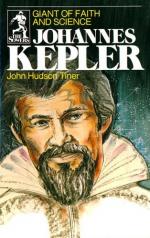|
This section contains 2,353 words (approx. 8 pages at 300 words per page) |

|
SOURCE: "The Rise of Science and the Decline of Orthodox Christianity: A Study of Kepler, Descartes, and Newton," in God and Nature: Historical Essays on the Encounter between Christianity and Science, edited by David C. Lindberg and Ronald L. Numbers, University of California Press, 1986, pp. 218-37.
Below, Westfall discusses the theological underpinnings of Kepler's scientific thought.
Johannes Kepler: Christian Cosmologist
After his skill in astronomy, religious devotion is probably the best-known characteristic of Johannes Kepler (1571-1630). One is tempted to use him as the example of traditional orthodoxy on the eve of Europe's plunge into the cold bath of skeptical inquiry. Such a use would do scant justice to the intensity of Kepler's religious pilgrimage. Differences on essential doctrines separated him from each of the major denominations and greatly complicated his life in an age of confessional conflict. "Yet it is not my way to become a hypocrite...
|
This section contains 2,353 words (approx. 8 pages at 300 words per page) |

|


